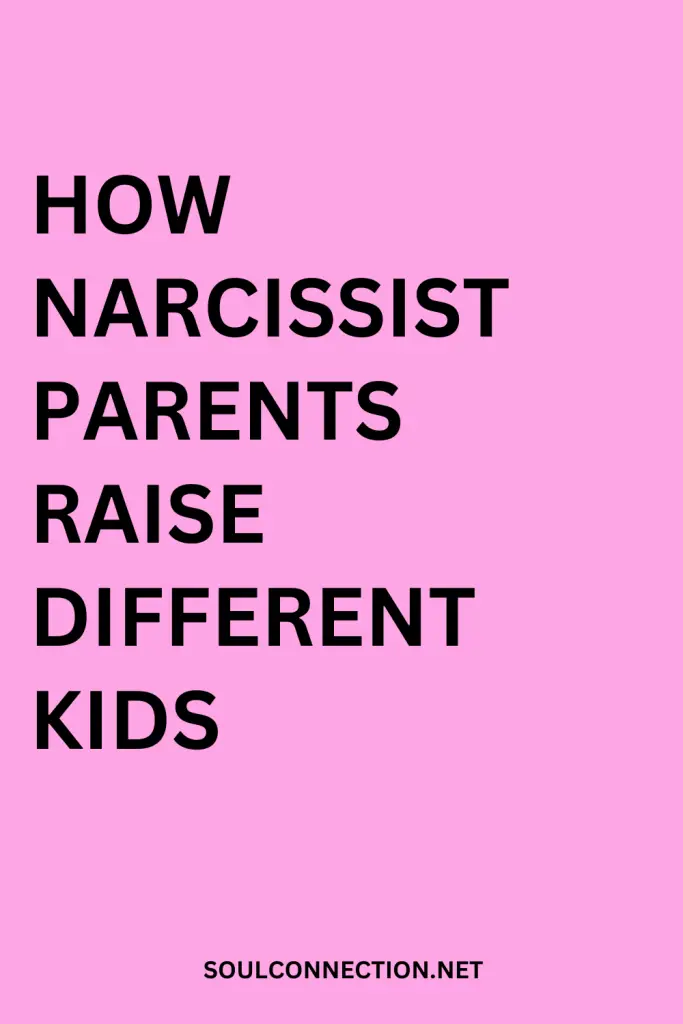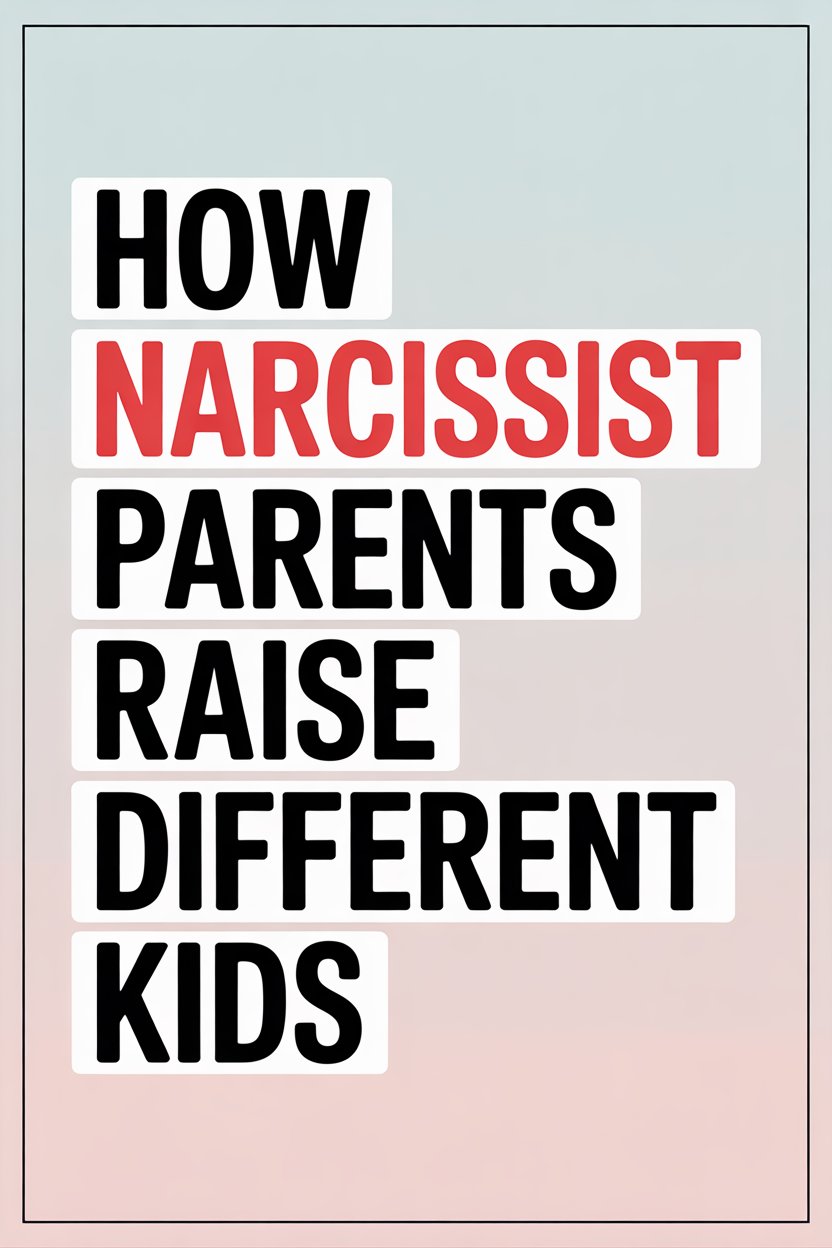Some families feel like a sitcom: everyone plays their part, quirks included. When one or both parents are narcissists, though, the script takes a turn.
Suddenly the plot thickens, with siblings who grow up in the same house but end up starring in wildly different genres.
Let’s pull back the curtain on why kids raised by narcissistic parents can turn out so unalike, and what you can do about it now—even if the family photo hides a hundred unspoken stories.
How Narcissism Warps Parenting
Narcissist parents don’t simply love themselves a bit too much. Their parenting is driven by an unquenchable thirst for admiration and control.
Kids aren’t seen as unique people but as satellites orbiting the parent’s ego.
Some children get cast as the “golden child,” others as the “scapegoat.” Sometimes you’ll spot a “lost child” floating quietly in the background, or a “hero child” trying to save the day.
Why are these roles so sticky? It’s not about birth order or luck. It’s about how the narcissist parent soaks up validation from their children—and who gets left out in the rain.
The Golden Child
The golden child is the apple of the narcissist’s eye. This kid is put on a pedestal, receiving praise and privileges galore, but there’s a catch: the love is conditional.
The golden child is allowed to shine, as long as their success reflects well on the narcissist. Any hint of independence, disagreement, or failure can topple them from grace.
The golden child often grows up anxious, perfectionistic, and desperate to keep winning approval—even if it means losing themselves in the process.
Pressure to stay number one can turn the golden child into a miniature narcissist or a people-pleasing adult terrified of making mistakes. Not exactly a recipe for inner peace.
The Scapegoat
Every narcissist parent needs someone to blame for their bad days. Enter the scapegoat. This child is singled out for criticism, blamed for family problems, and never quite “good enough.”
The scapegoat gets saddled with labels—rebellious, difficult, too sensitive—when really, they’re just not interested in playing the narcissist’s game.
This role can breed resilience, empathy, and a killer sense of humor (sarcasm becomes their second language). But the scars run deep.
Many scapegoats grow up to battle low self-esteem, trust issues, and a lifelong belief that they’re unlovable.
Still, the scapegoat is often the first to see through the narcissist’s façade. If you’re the black sheep at family gatherings, odds are you know exactly who’s pulling the strings.
The Lost Child
There’s always one kid who slips under the radar. The lost child blends into the wallpaper, going quiet to avoid attention—good or bad.
Narcissist parents don’t have much use for a child who doesn’t fill their emotional needs.
Lost children learn to be self-sufficient, but loneliness shadows their independence. In adulthood, they might struggle to connect or assert themselves, staying on the sidelines even when they wish someone would just notice them.
It’s easy to wonder if invisible ink runs in their veins.
The Hero Child
Every dysfunctional family has one “fixer.” The hero child takes on responsibility well beyond their years, hoping that if they’re perfect enough, maybe the chaos will finally stop.
These kids excel in school, sports, or caretaking—anything that might win the narcissist’s approval or defuse tension at home. Hero children often grow up to be dependable adults.
But watch out: perfectionism, burnout, and chronic anxiety tend to follow them like a shadow.
They’re the reliable friend who’ll help you move house, bake you a cake, and still apologize if the icing isn’t quite right.
Role Switching
Roles aren’t set in stone. Narcissist parents like to keep everyone guessing. One year, the oldest is the golden child; the next, they’re sitting with the scapegoats.
Changes in the family (divorce, new siblings, or even the whims of the narcissist) can flip the script overnight.
This unpredictability breeds insecurity and sibling rivalry. Many adult siblings raised by narcissist parents don’t just feel “different”—they’re practically living in alternate universes.
Sibling Rivalry on Steroids
Normal sibling bickering is child’s play compared to what happens under a narcissist’s roof. Competition for parental approval gets ferocious.
The golden child may secretly resent the scapegoat’s freedom to rebel, while the scapegoat envies the golden child’s privileges.
Narcissist parents fan the flames, pitting siblings against each other to keep attention off their own flaws.
This divide-and-conquer strategy undermines trust between siblings, making future reconciliation a challenge—though not impossible, with some hard work and a dash of dark humor.
Aftereffects in Adult Life
Those childhood roles don’t fade away with age. The golden child might end up anxious, perfectionistic, or gravitate toward narcissistic partners.
The scapegoat may struggle with self-worth and relationships, finding themselves drawn to people who criticize or control them. The lost child might feel invisible, even in a crowded room.
Breaking the cycle starts with recognizing your role and how it shaped you. That’s the first step toward rewriting your script.
Reclaiming Your Identity
No narcissist parent wants their children to have boundaries—because boundaries mean less control. Setting limits as an adult, though, is crucial.
If you grew up the golden child, challenge the idea that your worth depends on achievement. If you were the scapegoat, practice self-compassion and remind yourself: you aren’t responsible for other people’s feelings.
Lost kids can experiment with speaking up, bit by bit. Hero children, try putting your own needs on the calendar. Just once, cancel plans and see what happens. (Spoiler: the world keeps spinning.)
Healing and Connection
Repairing relationships with siblings often means calling out the roles and having honest conversations—sometimes for the very first time. Compare notes. Share stories.
Laughter helps, but so does mourning the family you deserved but didn’t quite get.
Therapy, support groups, and trusted friends offer safe ground to process the past and build new patterns. Healing isn’t about blaming your parents forever.
It’s about understanding the script you were handed, then deciding if you want to keep playing the same part.
When You’re Parenting Now
Many survivors of narcissistic parents are terrified of “turning into their parents.” Good news: the fact you’re worried means you’re already breaking the cycle.
Try this: listen to your kids. Validate their feelings, even the messy ones. Teach them it’s safe to be imperfect and to disagree—without love being withdrawn as punishment.
Family isn’t about roles. It’s about connection, honesty, and the freedom to be yourself.
Finding Your Own Ending
Growing up with a narcissist parent isn’t a life sentence to dysfunction or drama-filled holidays. Kids raised in the same house don’t have to end up strangers to each other—or to themselves.
Spot the patterns, share the truth, and pick up the pen. Your story isn’t over and, unlike your childhood, you get to write the ending this time.
Grab your metaphorical pen and start scribbling. The next chapter is yours.


